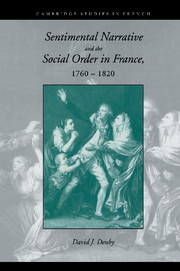Book contents
- Frontmatter
- Contents
- Acknowledgements
- Note on spelling
- Introduction: the politics of tears
- 1 Three sentimental writers
- 2 Towards a model of the sentimental text
- 3 Love and money: social hierarchy in the sentimental text
- 4 Sentimentalism in the rhetoric of the Revolution
- 5 Sentimentalism and idéologie
- 6 Beyond sentimentalism? Madame de Staël
- Conclusions
- Notes
- Bibliography
- Index
- CAMBRIDGE STUDIES IN FRENCH
Introduction: the politics of tears
Published online by Cambridge University Press: 29 August 2009
- Frontmatter
- Contents
- Acknowledgements
- Note on spelling
- Introduction: the politics of tears
- 1 Three sentimental writers
- 2 Towards a model of the sentimental text
- 3 Love and money: social hierarchy in the sentimental text
- 4 Sentimentalism in the rhetoric of the Revolution
- 5 Sentimentalism and idéologie
- 6 Beyond sentimentalism? Madame de Staël
- Conclusions
- Notes
- Bibliography
- Index
- CAMBRIDGE STUDIES IN FRENCH
Summary
‘Daddy, were the Indians goodies?’ The question, delivered, like all the best unanswerable children's questions, over breakfast and without apparent warning, has a genealogy which takes us to the heart of the matter. A few weeks before, in response to questions about the story of the cowboys and the Indians, I had explained to my six-year-old son that there might be a way of telling the story other than the established one: the cowboys had landed in the Indians' country and, one way and another, had destroyed their society and all but wiped them out. Here was a liberal parent trying, gently and without melodramatic excess, to encourage critical thinking about a powerful collective myth of our society. My contribution – recounted here, needless to say, in adultspeak – had, essentially, been to attribute agency to the cowboys: they had landed, they had wiped out the Indians; implicit in my version was a state of harmony, a prehistory lying beyond the irruption of narrative; and, clearly, my intervention was a moral evaluation, in the sense that I was questioning the identification with the heroic cowboys and setting straight the historical record. John's delayed-action response, based as it was on a retranslation of my remarks into the logic of story-telling, demonstrated an impeccable understanding of what I had been trying to say. His question struck me then as a particularly vivid confirmation of the kind of links between narratives, value-systems and the construction of history which this book attempts to chart.
- Type
- Chapter
- Information
- Publisher: Cambridge University PressPrint publication year: 1994



